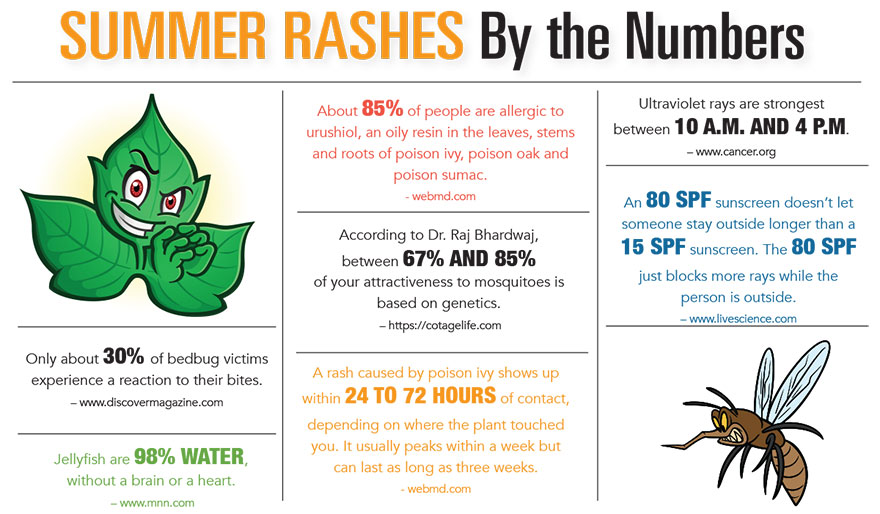Summer is a great time to be outdoors in South Carolina. Whether you love hanging out at the beach, trekking along mountain trails, sailing, swimming, boating or kayaking – or simply lounging around the pool – you’re almost certain to discover fun and interesting ways to occupy your leisure hours.
If you’re not careful, however, you might also fall victim to one or more of an array of skin issues that range from kind of uncomfortable to downright deadly. On occasion, you can treat these annoying problems on your own with over-the-counter medications, but there are times when a trip to see a medical professional is the best course of action, according to two local dermatologists.
Some people are not allergic to poison ivy and poison oak, but for others, the constant cycle of itching and scratching is enough to make life miserable. Most of the time, Dr. Lee Yarbrough of Charleston Dermatology said, these malicious maladies can be treated at home with hydrocortisone or anti-itch creams. He said if the situation doesn’t improve in a week or two, you should call your doctor and get some professional help, usually with prescription-strength topical steroids or with oral steroids such as prednisone.
“There’s only so much you can do with topicals,” added Dr. Mackenzie Gwynne, also of Charleston Dermatology. “If you have fever or chills, an extensive rash or eye involvement, you should see a doctor.”
Insect bites are irritating as well, but Dr. Yarbrough pointed out that most people are able to treat them with over-the-counter medications that help stop the itching temporarily. He said he doesn’t see many patients who have been attacked by bedbugs either, but he noted that if the bites are large and last longer than expected, a physician can prescribe topical or oral steroids to solve this problem. He said it’s also a good idea to find and get rid of the bugs in your mattress and also to make sure they haven’t spread to other bedrooms in your home.
Your day at the beach could be ruined by an encounter with a jellyfish or, even worse, a Portuguese man-of-war. Dr. Yarbrough said if you are stung by one of these creatures of the sea, you should attempt to remove the tentacles with tweezers and soak the area with hot water. He pointed out that both steroids and pain medication might be necessary.
“A man-of-war sting is quite impressive. It can be very painful,” he said, adding that patients should be monitored for symptoms such as an elevated heart rate and shortness of breath.
Another skin problem that could worsen as the temperatures warm is Eczema, a condition that causes the skin to become inflamed or irritated.
“Your allergies are flaring in the spring, and the eczema tends to flare, too,” Dr. Gwynne explained. “The more you itch, the more you flare.”
She said eczema can be treated with moisturizing cream, topical steroids or antihistamines, though she pointed out that an injection of a new product – Dupixent – has become “a world changer.”
Sunburn, of course, is an issue in sunny South Carolina, especially for people making that first trip of the season to the lake or ocean. Dr. Yarbrough said sunburn usually can be treated at home with cold compresses, topical steroids and painkillers such as Advil or ibuprofen. He added, however, that you should seek professional medical help if you are experiencing fever, chills or uncontrolled pain.
He noted that some patients who are taking doxycycline, minocycline or Accutane for acne are more sensitive to the rays of the sun.
The sun can contribute to more serious issues. Dr. Gwynne said basal cell carcinoma is the most prevalent form of cancer in the United States. Other skin cancers include squamous cell and the least common but by far the most deadly – melanoma, which accounts for only 1% of skin cancers but 90% of skin cancer deaths.
When should you be concerned? Dr. Gwynne said a growth that increases in size or appears translucent, pink, brown, black or multicolored should be looked at by a medical professional. She added that a mole, brown spot or birthmark that increases in size or thickness or changes color or texture is also a warning sign, as is a spot or sore that continues to itch, hurt, crust, scab or bleed or an open sore that doesn’t heal within three weeks.
Skin cancer can be caused by damage from the sun, though some people are genetically predisposed to these cancers.
Dr. Yarbrough said skin cancer occasionally is treated with topical cream, and radiation also is a possibility. In most cases, the cancer has to be surgically removed. Dr. Gwynne said if it is in an area where there isn’t a lot of skin, such as the face or back of the hand, Mohs surgery, where thin layers of skin are removed and examined until there is only cancer-free tissue, is a viable option.
So what can you do to help avoid skin cancer?
“Protect, protect, protect,” according to Dr. Yarbrough, which includes wearing protective clothing, applying sunscreen with an SPF (sun protection factor) of at least 30 every few hours and staying out of the sun between the hours of 10 a.m. and 4 p.m. if at all possible.
“A lot of times, we recommend zinc or titanium sun blockers. They are actual physical barriers instead of chemical barriers to the sun,” Dr. Gwynne concluded.
By Brian Sherman
Sun Exposure and Your Acne Meds
Are you on an acne regimen? You are not alone. The American Academy of Dermatology states that acne affects up to 50 million Americans annually and that costs for treating it exceed $1.2 billion a year. If you are taking acne medication, has your dermatologist discussed with you the higher risk with sun exposure? We spoke with Dr. Todd Schlesinger of the Dermatology and Laser Center of Charleston to find out what you need to know.
HealthLinks: “What do people need to know about acne regimens in the summer months, when they are exposed to more intense UV rays?”
Dr. Schlesinger: “Some acne regimens can make people more sensitive to the sun. For example, for those taking antibiotics (anti-inflammatory medications) such as doxycycline or minocycline, sunburn can occur more easily. The sunburn that may happen while on these medications is a little different from a normal sunburn in that it may be more painful and red. This is because the medication changes how the skin reacts to ultraviolet and even visible light from the sun. Sunscreen may not protect against this kind of sunburn either because the spectrum of light the skin is reacting to is shifted from ultraviolet, which is reduced by sunscreen to visible light, which is not. Only white or opaque sunblocks, staying indoors or wearing sunblock clothing will protect the skin. Newer anti-inflammatory medications such as sarecycline, which was recently approved, are less likely to result in excess sun sensitivity, and they have the advantage of easier dosing schedules. The same applies to acne medications used on the skin. For example, the old Retin A used to make people red when they went into the sun – the same with benzoyl peroxide. This was thought in the past to be related to its tendency to slough off some of the outer protective cells of the skin while making the skin a little thinner on the surface, or it may be some of the metabolites of tretinoin (the active ingredient) that causes the problem. The evidence is not really there to prove these theories or even to show that the sensitivity exists. Newer medications such as adapalene and trifarotene have demonstrated reduced sun sensitivity in studies. Bottom line – sun exposure causes skin cancer. Be sure to limit your exposure, wear sunscreen and protective clothing and remember to get your whole body skin checked by a dermatologist once a year at minimum.”
HealthLinks: “Should people practice a different acne regimen in the summer? Less often? Quit it during the summer? Will it make acne worse?”
Dr. Schlesinger: “People do not necessarily have to change their acne regimen in the summertime. If someone is taking one of the older antibiotics for acne such as doxycycline or minocycline, then it might be wise to reduce the dose or change to a different medication if sun exposure is expected. For most modern topically applied medications, no change is needed. Of course, always wear sunscreen, sun blocking clothing and limit sun exposure. One thing to know is that ultraviolet light from sun suppresses the skin’s immune function, which may make acne clear up by reducing the inflammatory part. However, the benefit is outweighed by the harmful effects of ultraviolet exposure on the skin in terms of skin cancer. If someone is using a particularly strong product or doing a lot of exfoliation or skin scrubbing, they may wish to cut back on this in the summer to avoid irritation.”
HealthLinks: “What are the risks? Are they indeed higher for sunburn?”
Dr. Schlesinger: “For the older medications, such as doxycycline and minocycline, the risk of sunburn is indeed higher. For most of the topically applied acne medications, the risk is minimally different, especially if sunscreen is used and sun exposure is limited.”
HealthLinks: “What can people do to keep their skin clean to fight against acne?”
Dr. Schlesinger: “People should continue their skin cleansing regimen and treatments for acne if they are prescribed. Sunscreen is a must. Washing the face excessively can cause irritation, so do not overdo it. Sometimes, people feel more oily in the summer due to the heat and sweat. In this case, wash the face with cool water and a mild facial cleanser to remove excess oils from the skin. Other things that can help are mild treatments in the dermatologist’s office like HydraFacial©, light peels and light plus suction treatments such as TheraClear™. These treatments can produce a deeper cleansing and hydration of the skin while reducing acne-causing bacteria and removing excess oils and inflammatory byproducts.”
HealthLinks: “Is acne worse in the summer?”
Dr. Schlesinger: “Acne can be worse or better in the summer. As mentioned above, UV light may improve acne by suppressing the skin’s immune function. However, if people do not maintain their skin care regimen, acne may be worse.”









